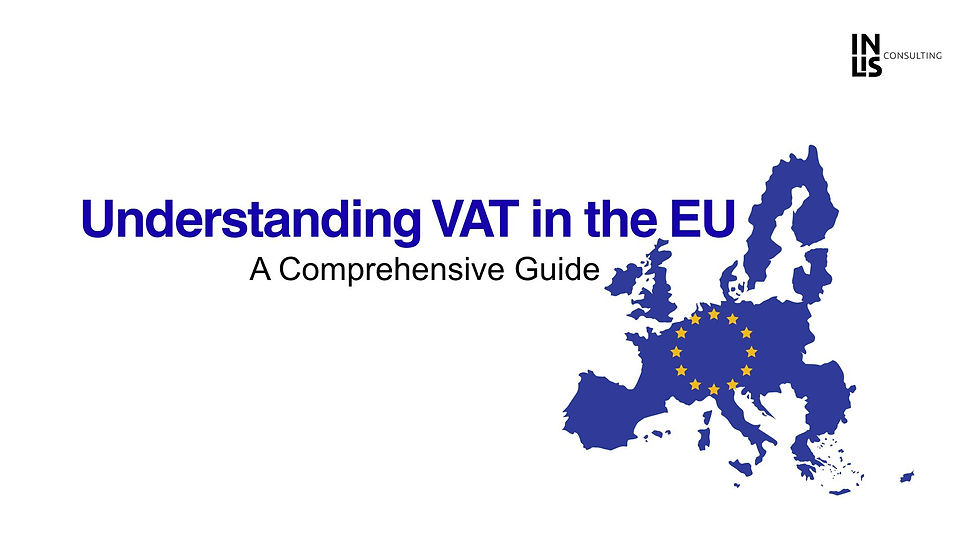Corporate Taxation in Portugal: 2025 Guide to CIT, Surtaxes & PE Rules
- INLIS Consulting
- Jul 22
- 8 min read
Resident companies in Portugal are taxed on their worldwide income. Non‑resident companies are taxed only on income attributable to a Portuguese permanent establishment (PE) or, where no PE exists, through withholding tax (WHT) on Portuguese‑source payments.

This guide explains how the system works in 2025, including the optional foreign PE exemption, base and reduced CIT rates, municipal and state surtaxes (Derrama), regional surtaxes for Madeira and the Azores, and Portugal’s extensive autonomous taxation regime on certain expenses.
Table of Contents
Who Is Taxed? Residency & Scope
Optional Exemption for Foreign Permanent Establishments
Headline Corporate Income Tax Rates
Reduced Rates for SMEs & Small Mid‑Caps
Inland & Beneficiary Territory Incentives
Entities Without Commercial Activity
Municipal, State & Regional Surtaxes (Derrama)
Autonomous Taxation on Expenses
Interaction With Withholding Tax for Non‑Residents
Worked Examples
Quick Compliance Checklist
How INLIS Consulting Can Help
FAQ
Disclaimer
Who Is Taxed? Residency & Scope
Resident companies (i.e., entities with either legal seat or place of effective management in Portugal) are subject to Portuguese Corporate Income Tax (Imposto sobre o Rendimento das Pessoas Coletivas, IRC) on worldwide income.
Non‑resident companies are taxable only on income attributable to a Portuguese permanent establishment (PE) or, absent a PE, through withholding tax (WHT) on specified categories of Portuguese‑source income (dividends, interest, royalties, certain service fees, etc.), subject to treaty relief.
Optional Exemption for Foreign Permanent Establishments
Portugal offers an optional regime to exclude from Portuguese taxation the profits (and losses) attributable to a qualifying foreign PE of a Portuguese‑resident company. Key eligibility conditions apply, and the election is jurisdiction‑wide and binding for at least three tax years.
Eligibility Conditions (All Must Be Met)
Subject‑to‑tax test: The PE’s profit must be subject to and not exempt from a tax listed in Article 2 of the EU Parent/Subsidiary Directive (2011/96/EU) or to a tax similar to Portuguese CIT at a statutory rate not lower than 60% of the Portuguese standard CIT rate. Given the 2025 mainland rate of 20%, the 60% floor implies a minimum foreign rate of 12%.
No Black‑Listed Jurisdiction: The PE cannot be located in a jurisdiction included on Portugal’s list of clearly more favourable tax regimes ("black list").
Effective Tax Burden Test: The effective tax paid abroad cannot be less than 50% of the CIT that would have been due under Portuguese rules, unless specific exceptions apply.
Loss Recapture Rule
The exemption does not apply to the portion of current PE profits up to prior PE losses (taken into account in Portugal) that were deducted in the preceding 12 tax years. Those profits are taxable in Portugal until recaptured.
Scope & Duration of Election
The election must cover all PEs located in the same foreign jurisdiction (no cherry picking by branch).
Once opted in, the regime is mandatory for at least three consecutive tax periods.
Headline Corporate Income Tax Rates
Base (Standard) CIT Rates – 2025
Jurisdiction | Standard CIT Rate | Applies To |
Mainland Portugal | 20% | Portuguese resident companies; Portuguese PEs of non‑resident entities located in the mainland. |
Autonomous Region of Madeira | 14% | Resident companies / PEs registered in Madeira. |
Autonomous Region of the Azores | 14% | Resident companies / PEs registered in the Azores. |
Reminder: Regional registration and effective management matter. If your company’s registered office is in Madeira but management and control occur mainly in Lisbon, residency analysis becomes more complex.
Reduced Rates for SMEs & Small Mid‑Caps
Portugal grants reduced introductory bands of CIT on the first slice of taxable income for qualifying SMEs and Small Mid‑Caps (including PEs of foreign entities). The standard reduced band applies to the first €50,000 of taxable income per tax year.
Taxpayer Type | Mainland Rate on First €50k | Madeira Rate on First €50k | Azores Rate on First €50k | Excess Taxed At |
SME / Small Mid‑Cap / Startup | 16% | 11.2% | 11.2% | Regional standard CIT rate (20% mainland; 14% Madeira; 14% Azores). |
Definitions:
"Micro, small and medium‑sized enterprises" follow EU Commission Recommendation 2003/361/EC (employee, turnover, and balance sheet tests).
"Small Mid‑Cap" aligns with definitions used by the European Investment Bank / European Investment Fund (size criteria above SME but below large cap; national transposition applies).
Inland & Beneficiary Territory Incentives
Certain territorial incentives further reduce the rate applied to the first band of taxable income for eligible smaller businesses.
Inland Territories (Portugal Mainland Interior)
12.5% rate on the first band (typically €50,000) of taxable income for SMEs, Small Mid‑Caps, and startups that both:
Carry out their activity in inland territories designated by law; and
Have their effective management located in those territories.
Beneficiary Territories – Madeira & Azores
8.75% rate on the first band (typically €50,000) of taxable income for qualifying SMEs / Small Mid‑Caps located in designated beneficiary territories within the Autonomous Regions of Madeira or the Azores. The applicable regional standard CIT rate then applies to the excess.
These incentive rates generally replace (rather than stack on top of) the ordinary SME reduced band. Eligibility documentation (location, activity, employment, management) should be retained.
Entities Without Commercial Activity
Entities whose main activity is not commercial, industrial, or agricultural are taxed at 20% in mainland Portugal and 14% in Madeira/Azores on their global taxable income. Examples may include certain holding entities, associations, or passive income vehicles—classification should be reviewed case‑by‑case.
Municipal, State & Regional Surtaxes (Derrama)
Portuguese corporate tax liability extends beyond the headline CIT rate. Three surtaxes may apply: Municipal (Local) Derrama, State Surtax (Derrama Estadual), and Regional Surtaxes in Madeira and the Azores.
1. Municipal Surtax (Derrama Municipal)
Up to 1.5% of taxable income (before loss carryforwards) as approved annually by each municipality.
Assessed and paid with the annual CIT return (Modelo 22).
2. State Surtax (Derrama Estadual)
Applies (before loss carryforwards) on graduated profit brackets per company:
Taxable Profit Bracket | Rate |
> €1.5m up to €7.5m | 3% |
> €7.5m up to €35m | 5% |
> €35m | 9% |
Applies to resident taxpayers carrying on commercial, industrial, or agricultural activities and to non‑residents with a Portuguese PE.
Generally paid in three instalments (similar to the advance payments regime; final reconciliation on return).
3. Regional Surtax (Derrama Regional)
Applicable to companies taxed in the Autonomous Regions:
Madeira
Taxable Profit Bracket | Rate |
> €1.5m up to €7.5m | 2.1% |
> €7.5m up to €35m | 3.5% |
> €35m | 6.3% |
Azores
Taxable Profit Bracket | Rate |
> €1.5m up to €7.5m | 2.4% |
> €7.5m up to €35m | 4% |
> €35m | 7.2% |
Autonomous Taxation on Expenses
Portugal applies autonomous taxation (Tributações Autónomas)—an extra layer of tax—on certain non‑deductible or consumption‑type expenses. These charges are self‑assessed in addition to CIT (and can apply even where no taxable profit arises). Rates vary by expense category and sometimes by company profitability.
Standard Rates (Unless Otherwise Stated)
Expense Category | Rate |
Representation & entertainment expenses | 10% |
Mileage allowance | 5% |
Per diem allowance | 5% |
Non‑documented expenses | 50% (or 70% if taxpayer wholly/partially exempt) |
Dividends distributed to exempt shareholders for holdings < 1 year | 23% |
Termination compensation to managers/board (non‑performance related; excess amounts; liability shifted) | 35% |
Bonuses to managers/board >25% of annual salary and >€27,500 | 35% |
Payments to entities in black‑listed / favourable regimes (w/o proof of normality) | 35% or 55% (higher sanction tier) |
Company Car Expenses (Fuel, Depreciation, Lease, Insurance, Maintenance, Taxes)
Rates depend on vehicle type and acquisition cost (EUR). Applies regardless of acquisition year unless excluded (public transport vehicles; cars taxed fully as income in kind to employees).
Acquisition Cost (EUR) | Plug‑In Hybrid* | Vehicle Natural Gas (VNG) | Other Vehicles | Fully Electric |
< €37,500 | 2.5% | 2.5% | 8.0% | – |
€37,500 – €45,000 | 7.5% | 7.5% | 25.0% | – |
≥ €45,000 | 15.0% | 15.0% | 32.0% | – |
> €62,500 | – | – | – | 10.0% |
*Plug‑in hybrid definition: Rechargeable via grid; min 50 km electric range; <50 g CO₂/km official emissions.
Relief From 10‑Point Increase in Loss Years
Historically, autonomous taxation rates increased by 10 percentage points when the taxpayer recorded a tax loss for the year. This uplift ceases if either condition is met:
The taxpayer reported taxable profit in at least one of the three preceding tax periods and timely filed the required Modelo 22 and IES for the prior two periods; or
The 2025 tax period is the first period of activity or one of the two subsequent periods.
Gifts of Show Tickets No Longer Taxed
Expenses for shows offered to customers, suppliers, or other third parties are no longer subject to autonomous taxation (subject to documentation—keep records of business rationale).
Interaction With Withholding Tax for Non‑Residents
Where a non‑resident company earns Portuguese‑source income without a PE, the income may be taxed via withholding at domestic rates (which vary by payment type) unless reduced by an applicable double tax treaty, EU directive (e.g., Parent‑Subsidiary, Interest & Royalties), or domestic exemption.
If the non‑resident has a Portuguese PE, income attributable to that PE is taxed under the CIT regime (20% mainland; 14% Madeira/Azores), plus relevant surtaxes and autonomous taxation on expenses. Treaty permanent establishment definitions may affect attribution.
Worked Examples
Example 1 – Mainland SME (Profitable)
Taxable income: €120,000.
Qualifies as SME; no inland incentive.
Computation:
First €50,000 @16% = €8,000.
Remaining €70,000 @20% = €14,000.
Municipal Derrama (assume 1% local) on €120,000 = €1,200.
No state surtax (profit < €1.5m).Total CIT + Derrama = €23,200 (effective ~19.3%).
Example 2 – Madeira Small Mid‑Cap (Beneficiary Territory Incentive)
Taxable income: €300,000.
Qualifies; located in the beneficiary territory.
Computation:
First €50,000 @8.75% = €4,375.
Excess €250,000 @14% = €35,000.
Regional Surtax brackets not triggered (<€1.5m).Total = €39,375 (effective 13.1%).
Example 3 – Large Mainland Group (High Profit, Cars, Representation)
Taxable income: €40m.
Representation expenses: €100k → 10% = €10k autonomous tax.
Company cars (mixed fleet, assume 25% blended) cost band yields blended autonomous €250k.
Base CIT: €40m @20% = €8m.
State Surtax: 3% (1.5–7.5m) = €180k; 5% (7.5–35m) = €1.375m; 9% (>35m) = €450k.
Municipal Derrama assume 1.5% = €600k. Total tax cash cost ~€10.865m before credits. Effective ~27.2% incl. autonomous taxes.
Quick Compliance Checklist
Determine residency (legal seat vs effective management).
Confirm PE status abroad; decide on foreign PE exemption election.
Classify entity as SME / Small Mid‑Cap / Startup; document eligibility.
Check if located in an inland or beneficiary territory to access 12.5% / 8.75% rates.
Model municipal & state surtaxes exposure; monitor profit thresholds.
Track regional surtaxes if in Madeira/Azores.
Review ledger mapping for autonomous taxation categories (representation, travel, cars, black‑list payments).
Monitor loss years to manage the 10‑point rate uplift exposure.
Document changes in board composition & management location (residency evidence).
How INLIS Consulting Can Help
Our bilingual (Portuguese/English) tax team supports international and domestic clients through the full Portuguese corporate tax cycle:
Residency & PE analysis (Portugal & outbound branches).
Foreign PE exemption modelling and election filings.
SME / Small Mid‑Cap qualification review.
Incentive location reviews (inland territories; beneficiary areas in Madeira/Azores).
CIT computations, Derrama mapping, and advanced payment planning.
Autonomous taxation review of the general ledger for potential savings.
Treaty relief & WHT reclaims for cross‑border flows.
Ongoing compliance: Modelo 22, IES, payments calendar.
Let’s talk. Email: geral@inlis.pt
FAQ
Are resident Portuguese companies taxed on worldwide income?
Yes. Portuguese tax residency exposes a company to CIT on global profits, with foreign tax credits or exemptions (e.g., PE regime) mitigating double tax.
Can I elect the foreign PE exemption for just one branch?
No. The election must cover all PEs in the same jurisdiction and bind you for at least three years.
What is the minimum foreign tax rate to qualify for the PE exemption?
60% of Portugal’s standard rate (20% mainland in 2025) → 12% statutory floor, plus effective tax burden test.
Do SME reduced rates stack with inland/beneficiary incentives?
No, the incentive rate typically replaces the standard SME band. Confirm case‑by‑case.
When do state surtax brackets apply?
Once taxable profit exceeds €1.5m, progressive 3% / 5% / 9% bands.
Do autonomous tax rates increase if I have tax losses?
Historically, yes (+10 p.p.), but the uplift is waived where you met profit/compliance tests in prior periods or are within start‑up relief years (see conditions above).
Are complimentary show tickets still hit by the autonomous tax?
No, they are excluded—maintain documentation.
Disclaimer
This blog is an informational summary of current rules believed to be in effect for tax periods beginning 1 January 2025 (or as otherwise noted).
Portuguese tax law changes frequently; regional assemblies may alter rates. Always obtain professional advice before acting. INLIS Consulting can provide tailored written advice under engagement.




Comments